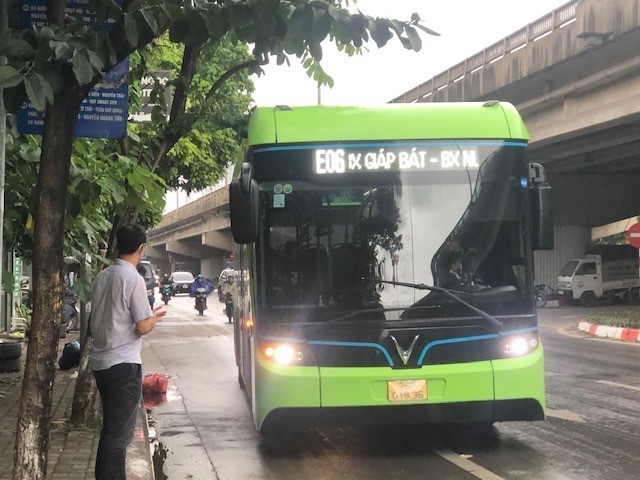 Society
Society

 |
| A man waits for an electric bus in Hoàng Liệt Ward, Hoàng Mai District, Hà Nội.— VNA/VNS Photo Tuyết Mai |
HÀ NỘI — Hà Nội is advised to issue a clear and specific plan to replace all petrol-and diesel-powered public buses with electric vehicles.
Nguyễn Trọng Thông, chairman of the Hà Nội Transport Association, said developing electric or green-energy vehicles in public transport was an inevitable trend of developed cities.
Operating this type of vehicle would be good for both the environment and climate, he added.
However, it would require a detailed roadmap to limit the impact and disturbance of public passenger transport when the replacements are made, he said.
A representative of Hà Nội Transportation Corporation (Transerco) suggested that the city have a clear plan for deploying electric buses so that operating businesses can make adequate preparations.
The city should also consider adjusting operating requirements in accordance with the technical specifications of electric buses, he said.
It should adjust the daily capacity for electric buses not exceeding 250 km per vehicle daily, he said.
The city must also compile bidding documents for the operation of bus routes, including operating norms and prices for petrol-and diesel-powered buses and electric buses as a basis for enterprises to switch to electric buses, he said.
The city should run a consistent policy and allocate enough subsidy budget to ensure annual stability for the bus network when gradually switching to electric buses in order to stabilise the service quality of the public transport network of the capital, he said.
Statistics from Transerco show that an electric bus’s battery can run from 250km to 300km per a single charge.
To ensure that there is no problem of running out of power, it is recommended an electric bus run a maximum distance of 230 to 250km per one charge.
The current-piloted electric bus routes in the city now have a running distance of 230-240km for each bus daily.
In the meantime, the petrol-and diesel-powered buses that Transerco is operating in the inner areas often run on average 250-300km per vehicle daily; in many routes, the buses run over 300km daily.
Therefore, for routes with a capacity of over 250km per bus daily, additional charging stations must be arranged.
Under Transerco's calculations, converting nearly 1,100 buses using diesel engines to electric buses requires the support of the local power units to ensure a large and safe power supply.
Thái Hồ Phương, Deputy Director of the Hà Nội Public Transport Management Centre said in order to deploy the model of electric buses the capital would have to solve arising problems including the following.
There is no electric bus manufacturer in the country.
Only Vinfast Manufacturing and Trading Joint Stock Company imports, assembles and pilots operation of electric buses on nine bus routes in the city.
The Ministry of Transport has just issued national technical regulations on quality, technical safety and environmental protection for coaches, but there is no separate regulation for electric buses.
It noted the import and assembly of electric buses would take time and higher costs than common buses.
The centre has suggested the city's Transport Department convert from petrol-and diesel-powered buses to electric buses according to the principle that new bus routes in the period of 2023-30 have to use electric buses.
It is expected that the number of vehicles for the new bus routes in the period is 4,800.
For current bus routes that must re-open bidding for operation since 2025 according to regulations, if the current buses have been operating for more than 10 years, they must be replaced with electric buses.
If the buses have been operating for less than 10 years, they are allowed to be operated for 10 years, then they must be replaced with electric buses as required.
The transport department said it would advise the city on a specific roadmap to replace petrol-and diesel-powered buses with electric buses following the direction of the Prime Minister and ensure that there is no disturbance to the travel of passengers and avoid waste for transport businesses that have invested in petrol-and diesel-powered buses.
Previously, the Government issued Decision No 876/QĐ-TTg on July 22, 2022 approving the Action Programme on Green Energy Transformation, Carbon and Methane Emissions Reduction in Urban Transport.
Under the decision, all newly-operated buses must use electricity or green energy since 2025. By 2050, all buses in the city must use electricity and green energy.
Currently, Transerco is operating 83 bus routes and one bus rapid transport (BRT) line with a total of nearly 1,100 vehicles.
It is estimated that the company needs about VNĐ21 trillion (US$889 million) to replace all petrol- and diesel-powered public buses with electric alternatives. — VNS




